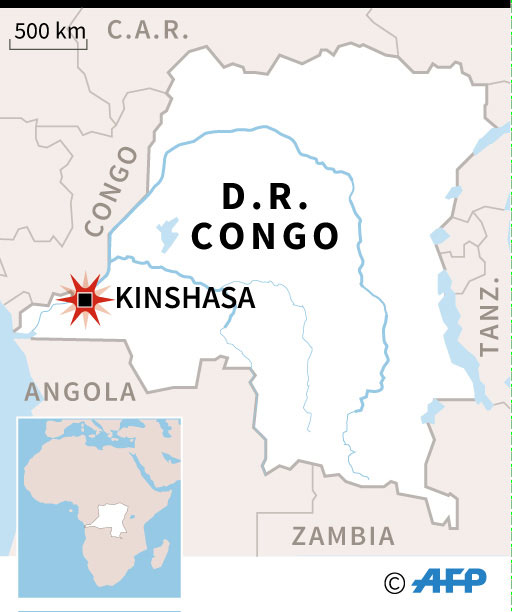
Kinshasa, DR Congo | AFP | Elections in Democratic Republic of Congo — due to take place on Sunday — may be postponed for a week, a senior electoral official has told AFP, after electronic voting machines were destroyed in a suspected arson attack on a warehouse last week.
The official, from the Independent National Election Commission (CENI), speaking on condition of anonymity, said on Wednesday that both the presidential and legislative polls could be delayed.
President Joseph Kabila is scheduled to step down after nearly 18 years in power following the elections — which are already two years overdue.
Nearly 8,000 of some 10,000 voting terminals for the capital Kinshasa were destroyed in the warehouse blaze last Wednesday, according to CENI.
Around 11 percent of the country’s 44 million registered voters live in the city.
Opposition candidates last week suggested the government could have been behind the fire, to use as a pretext to again delay the vote.
A “seven-day postponement” is being discussed, the CENI official said on Wednesday, as efforts are made to obtain replacement machines.
“We are not going to ask for anyone’s opinion, even that of the head of state,” the source insisted, adding that a formal decision may be announced on Thursday.
CENI head Corneille Nangaa is considering that matter and will hold a press conference on Thursday in Kinshasa, a spokesman for the election commission said.
– ‘Extremists are prepared’ –
The possible election postponement comes as problems have piled up ahead of the December 23 vote, with violence at electoral rallies, inter-ethnic conflict, militia attacks in the east and an Ebola outbreak.
Electoral campaigning began on November 22, since when at least six people have died in violence, according to Congolese rights NGO Acaj.
The authorities deny that there have been any deaths linked to the campaign.
The governor of Kinshasa on Wednesday announced a ban on all public rallies due to security concerns — as opposition hopeful Martin Fayulu said he had been blocked from entering the city.
“Extremists are prepared and are preparing for confrontations in the streets of the city of Kinshasa during election campaigning,” governor Andre Kimbuta said in a statement.
The ban applies to “all presidential candidates, without exception,” Kimbuta said, giving no details as to how long the measure would last.
Fayulu had been due to hold a meeting in the city.
The opposition candidate said on Twitter that the government had “prevented (him) from returning” to Kinshasa and that his motorcade had been attacked in Masinimba, east of the capital.
“What are they are afraid of?” he asked.
Police blocked the N1 highway on the city’s outskirts, which Fayulu’s motorcade would have used, and fired teargas to disperse several hundred supporters who had come to greet him, an AFP reporter saw.
Fayulu has repeatedly accused the authorities of trying to thwart regional campaign appearances in the sprawling country.
– Crucial vote –
More than 40 million people are eligible to cast their vote on Sunday.
The elections are a huge challenge for DRC, which has never known a peaceful transition of power since it gained independence from Belgium in 1960.
Kabila, 47, came to power after his father was assassinated in 2001.
He is at the helm of a government that critics say is notorious for corruption, incompetence and rights abuse.
Kabila should have stepped down as president at the end of 2016 when he reached a two-term limit.
He stayed on, invoking a caretaker clause in the constitution, but at the cost of protests that were bloodily repressed.
– Front-runners –
Twenty-one candidates are vying to replace him.
The pack is led by Kabila’s hand-picked successor Emmanuel Ramazani Shadary, a hardline former interior minister linked to the crackdown, and opposition leaders Fayulu and Felix Tshisekedi.
Fayulu, 62, was a little-known legislator from a minority party who was thrust into the limelight on November 11 when opposition leaders named him their choice as a consensus candidate.
His nomination was initially backed by six other opposition leaders, including two political heavyweights — ex-warlord Jean-Pierre Bemba and businessman Moise Katumbi, an exiled former provincial governor, both of whom were blocked from running.
But the deal swiftly fell apart as Tshisekedi, who heads the UDPS — the country’s oldest and biggest opposition party — insisted he would take his own tilt at the presidency.
Adding to political tensions is the logistical hurdle of organising the elections.
Parts of eastern DRC are in the grip of militia violence and an Ebola epidemic, raising many questions about whether an orderly ballot can take place there.
 The Independent Uganda: You get the Truth we Pay the Price
The Independent Uganda: You get the Truth we Pay the Price


